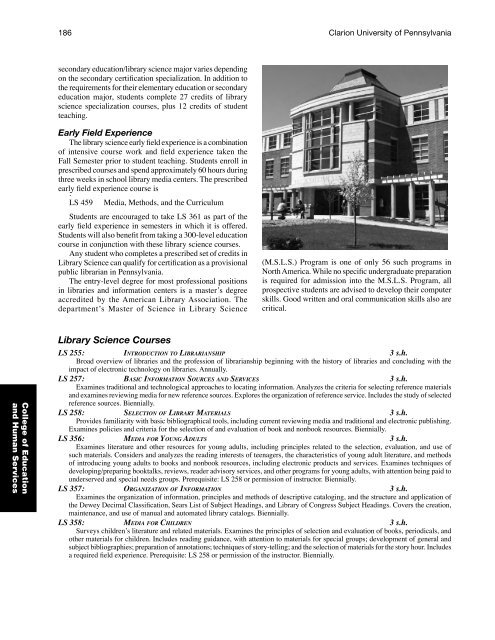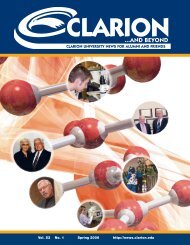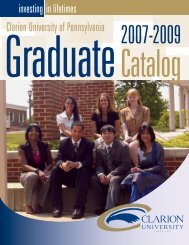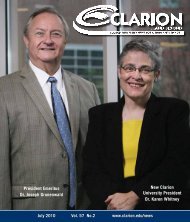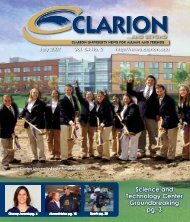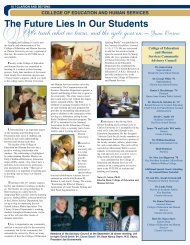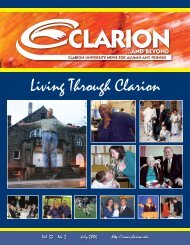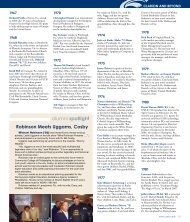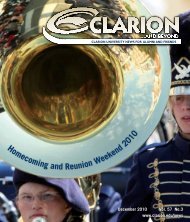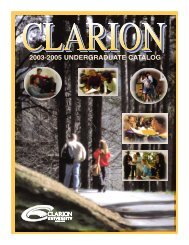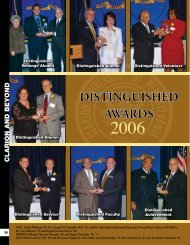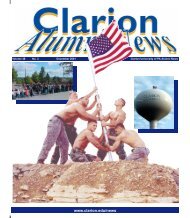Undergraduate - Clarion University
Undergraduate - Clarion University
Undergraduate - Clarion University
- No tags were found...
Create successful ePaper yourself
Turn your PDF publications into a flip-book with our unique Google optimized e-Paper software.
pages i-viii186 <strong>Clarion</strong> <strong>University</strong> of Pennsylvaniasecondary education/library science major varies dependingon the secondary certification specialization. In addition tothe requirements for their elementary education or secondaryeducation major, students complete 27 credits of libraryscience specialization courses, plus 12 credits of studentteaching.Early Field ExperienceThe library science early field experience is a combinationof intensive course work and field experience taken theFall Semester prior to student teaching. Students enroll inprescribed courses and spend approximately 60 hours duringthree weeks in school library media centers. The prescribedearly field experience course is:LS 459 Media, Methods, and the CurriculumStudents are encouraged to take LS 361 as part of theearly field experience in semesters in which it is offered.Students will also benefit from taking a 300-level educationcourse in conjunction with these library science courses.Any student who completes a prescribed set of credits inLibrary Science can qualify for certification as a provisionalpublic librarian in Pennsylvania.The entry-level degree for most professional positionsin libraries and information centers is a master’s degreeaccredited by the American Library Association. Thedepartment’s Master of Science in Library Science(M.S.L.S.) Program is one of only 56 such programs inNorth America. While no specific undergraduate preparationis required for admission into the M.S.L.S. Program, allprospective students are advised to develop their computerskills. Good written and oral communication skills also arecritical.College of Educationand Human ServicesLibrary Science CoursesLS 255: Introduction to Librarianship 3 s.h.Broad overview of libraries and the profession of librarianship beginning with the history of libraries and concluding with theimpact of electronic technology on libraries. Annually.LS 257: Basic Information Sources and Services 3 s.h.Examines traditional and technological approaches to locating information. Analyzes the criteria for selecting reference materialsand examines reviewing media for new reference sources. Explores the organization of reference service. Includes the study of selectedreference sources. Biennially.LS 258: Selection of Library Materials 3 s.h.Provides familiarity with basic bibliographical tools, including current reviewing media and traditional and electronic publishing.Examines policies and criteria for the selection of and evaluation of book and nonbook resources. Biennially.LS 356: Media for Young Adults 3 s.h.Examines literature and other resources for young adults, including principles related to the selection, evaluation, and use ofsuch materials. Considers and analyzes the reading interests of teenagers, the characteristics of young adult literature, and methodsof introducing young adults to books and nonbook resources, including electronic products and services. Examines techniques ofdeveloping/preparing booktalks, reviews, reader advisory services, and other programs for young adults, with attention being paid tounderserved and special needs groups. Prerequisite: LS 258 or permission of instructor. Biennially.LS 357: Organization of Information 3 s.h.Examines the organization of information, principles and methods of descriptive cataloging, and the structure and application ofthe Dewey Decimal Classification, Sears List of Subject Headings, and Library of Congress Subject Headings. Covers the creation,maintenance, and use of manual and automated library catalogs. Biennially.LS 358: Media for Children 3 s.h.Surveys children’s literature and related materials. Examines the principles of selection and evaluation of books, periodicals, andother materials for children. Includes reading guidance, with attention to materials for special groups; development of general andsubject bibliographies; preparation of annotations; techniques of story-telling; and the selection of materials for the story hour. Includesa required field experience. Prerequisite: LS 258 or permission of the instructor. Biennially.


